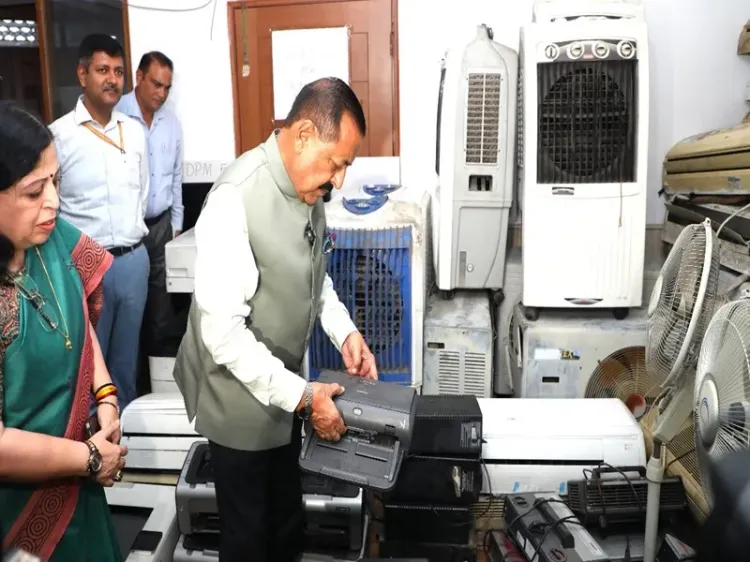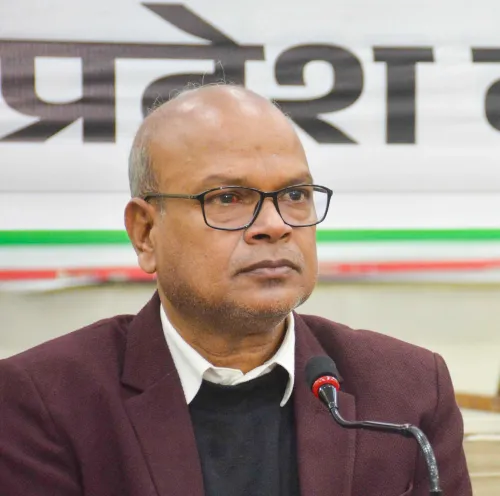How Much Has the Govt Earned from Scrap Disposal in Swachhata Campaign 5.0?

Synopsis
Key Takeaways
- Rs 387 crore generated in just three weeks.
- Projections of up to Rs 10,000 crore by October 31.
- Over 148 lakh square feet of office space reclaimed.
- Promotion of ‘Waste to Wealth’ philosophy.
- Recognition of 48 ‘Safai Mitras’ for their contributions.
New Delhi, Oct 28 (NationPress) In a remarkable achievement aligned with Prime Minister Narendra Modi's vision for a cleaner and more efficient India, the ongoing Special Swachhata Campaign 5.0 has successfully generated Rs 387 crore through scrap disposal within a mere three weeks. Projections suggest this figure could reach Rs 8,000–10,000 crore by the campaign's end on October 31.
Union Minister of State (Independent Charge) for Science and Technology and Earth Sciences, Dr Jitendra Singh, praised the initiative as a transformative “Waste to Wealth” program, which has freed up over 148 lakh square feet of valuable office space while encompassing more than 5.5 lakh sites across the nation.
Launched on October 2 - Gandhi Jayanti - under the guidance of the Department of Administrative Reforms and Public Grievances (DARPG), this month-long campaign builds on the foundations of the 2014 Swachh Bharat Abhiyan, evolving from basic sanitation to innovative methods of resource recovery and efficiency enhancement.
During a high-level Group of Ministers meeting, Dr Singh reviewed the campaign's progress, emphasizing its role in fostering behavioral change, fiscal responsibility, and clean governance. He shared significant updates through a detailed post on X on Monday, featuring visuals of cleaned workspaces that highlighted the campaign’s tangible impacts.
“As the campaign progresses from October 2 to 31, the figures from the first three weeks show that Rs 387 crore have already been earned through scrap disposal, with the total expected to rise to nearly Rs 8,000–10,000 crore by the end of the four-week campaign. The freeing of over 148 lakh sq. ft. of space is a testament to our collective resolve,” Dr Singh posted, urging ministries and state governments to incorporate tech-driven methods like AI-assisted inventory audits to enhance efficiency.
“This initiative isn't just about cleaning; it’s about transforming waste into wealth, in line with Prime Minister Modi’s innovative vision for a Viksit Bharat,” he added, advocating for wider adoption of best practices such as e-waste auctions and systematic document shredding across departments.
The early results of the campaign underscore its strong momentum. Scrap from outdated files, electronics, and machinery has not only increased government revenues but also reclaimed prime real estate for productive use.
For example, the India Meteorological Department (IMD) contributed Rs 30 lakh by auctioning off obsolete weather equipment, freeing up approximately 600 square metres of space at its Mausam Bhawan headquarters. Similarly, at DARPG’s Sardar Patel Bhawan, hundreds of paper and electronic files were digitized and closed, with segregated electronic waste generating additional revenue.
On a national scale, the initiative has led to the disposal of tonnes of redundant assets, significantly cutting down storage costs and reducing the government’s environmental impact. The fifth edition of the Special Swachhata Campaign also marked a significant milestone in clean governance, with over 48 ‘Safai Mitras’ honored across departments for their exemplary grassroots contributions.
As the campaign approaches its final week, experts believe that its success under the ‘Waste to Wealth’ model will inspire similar large-scale efforts across public sector undertakings, potentially unlocking billions in untapped value.
With Rashtriya Ekta Diwas on October 31 coinciding with the conclusion of the campaign, this initiative reaffirms that Swachhata has transcended being just a seasonal event — becoming a national ethos and a sustainable revolution for a cleaner, more efficient India.










